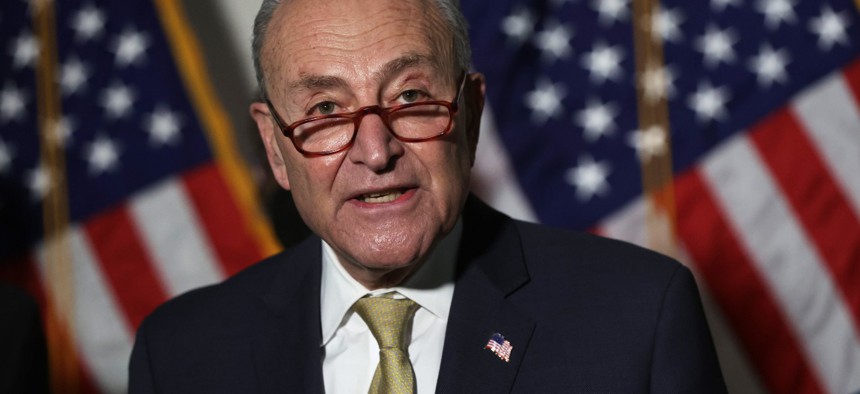
Senate Majority Leader Chuck Schumer, D-N.Y., said his chamber will take up the CR quickly and pass it before the deadline to avoid a shutdown. Alex Wong/Getty Images file photo
Agencies Would Be Funded Through March 11 Under a Stopgap Bill the House Passed
Senate leader says he is "more confident than ever" Congress will soon send full-year appropriations to Biden's desk.
The House on Tuesday passed 272-162 a three-week stopgap funding bill, sending to the Senate a measure to buy time to set agency spending levels and avoid a government shutdown.
The new continuing resolution would keep agencies afloat through March 11. Current funding is set to expire Feb. 18 and negotiators have yet to have a breakthrough to move forward on appropriations bills for the remainder of fiscal 2022. They have expressed some notes of optimism, however, and lawmakers said on Tuesday a short extension would allow for a deal and final votes while avoiding a shuttering of federal offices.
“I believe we are close to an agreement and I am eager to move the process forward and I have every expectation that we can finalize a framework in short order and work together to fill in the details,” Rep. Rosa DeLauro, D-Conn., who chairs the House Appropriations Committee, said on the House floor on Tuesday. “No one wins from additional continuing resolutions, which is why after we pass this extension, we will finalize an omnibus that would deliver for our nation.”
While some Republicans have teased the idea of a full-year CR, which would lock in agency spending at fiscal 2021 levels that were signed into law under President Trump, Democratic leadership has called it essential that Congress pass an omnibus bill to set line-by-line funding across government. Lawmakers have yet to agree on the allocations for defense and non-defense spending, a necessary precursor to finalizing the 12 appropriations bills Congress must pass each year.
Democrats have proposed big spending boosts at civilian agencies, nearly matching the 16% called for in President Biden’s budget request. They have pitched much smaller increases for Defense, which Republicans have called insufficient. The minority party is seeking parity in the defense and non-defense portions of the budget.
Top appropriators have met in recent weeks to try to reach an agreement. They have called those talks productive, but remain divided enough to abandon hopes of reaching an agreement before the Feb. 18 deadline.
Senate Majority Leader Chuck Schumer, D-N.Y., said on the Senate floor on Tuesday his chamber would quickly take up the CR and pass it before the Feb. 18 deadline to "avoid a pointless and costly government shutdown."
"My colleagues have made good progress, and I am optimistic that Democrats and Republicans can soon arrive at a top-line deal for an omnibus,” Schumer said. “I am more confident than ever before that we can reach agreement for an omnibus by March 11th, which is far more preferable to the alternative: a CR for the rest of the year."
Biden has already signed CRs in September and December to avoid shutdowns. Senate Minority Leader Mitch McConnell warned full appropriations would be “impossible” without parity for defense spending and if any “poison pill” riders are included.
“I hope our Democratic colleagues in both chambers will fully embrace this noncontroversial framework, which has been clear to everybody for months, so Congress can soon deliver the full-year funding that our service members need to keep us safe,” McConnell said.
Military leaders have warned of canceled bonuses, delayed modernization plans and postponed investments in equipment and training under a year-long CR. The White House has said such an outcome would negatively impact the COVID-19 pandemic response, national security and federal hiring. Pay increases would have to come at the expense of other priorities, it said, while the Social Security Administration would institute a hiring freeze, vacancies for food safety inspectors would go unfilled, NASA’s Mars program would be shortchanged and efforts to combat climate change would be unfunded.







